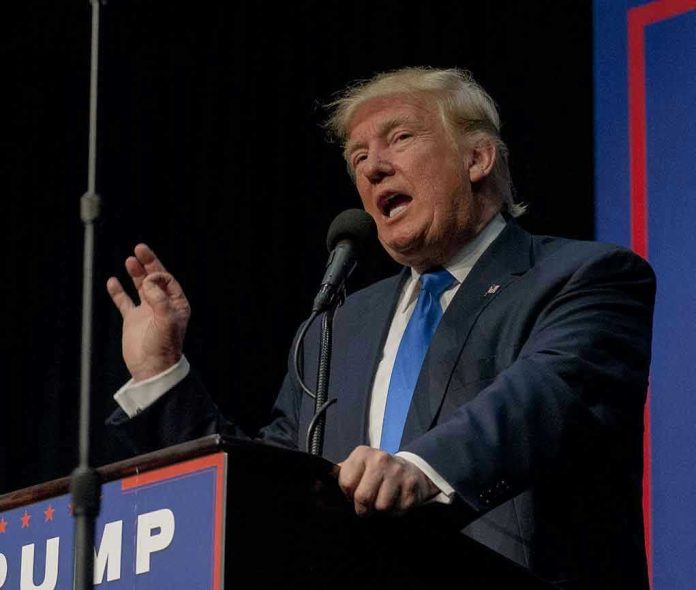
President Trump’s decision to suspend food aid benefits during the government shutdown has reignited debate over who should benefit from American taxpayer programs—and who should not.
Story Snapshot
- President Trump announced food aid will be withheld until the government shutdown ends, reversing prior administration signals.
- The move aligns with Trump’s broader push to prioritize American citizens for federal benefits and reduce taxpayer burdens from open border policies.
- Supporters argue this approach restores fiscal discipline and counters previous overspending and abuse of welfare programs.
- Critics warn that millions of Americans may face hardship, but the administration maintains that strong action is needed to end government dysfunction and protect conservative values.
Trump Administration Tightens Federal Benefit Disbursement During Shutdown
On Tuesday, President Trump announced that food aid benefits relied on by millions of Americans would be suspended until the ongoing government shutdown reaches a resolution. The message, delivered via Trump’s Truth Social platform, marks a decisive shift from previous administration policy, which had suggested partial benefits might still be distributed. The new stance reflects a commitment to leverage fiscal tools to resolve Washington gridlock, sending a clear signal that business as usual is over for federal handouts amid government dysfunction.
This decision has drawn sharp reactions nationwide. While critics express concern for vulnerable Americans, Trump supporters see the move as a necessary corrective to years of fiscal mismanagement and unchecked welfare expansion. The administration argues that only by standing firm on spending can the nation end cycles of shutdowns and restore accountability to government programs. This approach is consistent with Trump’s broader efforts to ensure federal assistance serves U.S. citizens first and clamps down on abuses enabled by lax eligibility standards.
Prioritizing Americans and Ending Taxpayer Subsidization of Open Borders
Since returning to office in 2025, President Trump has enacted executive orders aimed at limiting federal benefits to U.S. citizens, notably protecting over $40 billion in benefit programs from illegal aliens. The administration’s stance on food aid during the shutdown fits into a larger agenda: ending policies that have, in the past, allowed taxpayer dollars to subsidize those who enter or remain in the country illegally. Supporters argue this is a long-overdue correction that restores the rule of law and upholds the integrity of public assistance programs for hardworking American families.
Beyond the immediate impact of the food aid suspension, the administration has accelerated efforts to reform welfare and entitlement programs. Recent years have seen a rollback of regulations and a renewed emphasis on work requirements for able-bodied adults receiving government assistance. Trump’s team claims these reforms increase self-reliance and reduce dependency, outcomes that resonate strongly with conservative voters frustrated by what they see as the excesses of the previous administration.
Fiscal Responsibility Versus Human Impact: Divided National Response
The Trump administration’s actions are rooted in a philosophy of fiscal restraint and constitutional governance. By refusing to distribute food aid benefits until lawmakers resolve the shutdown, the White House underscores its refusal to continue what it calls the “overspending and reckless government overreach” of prior years. Supporters insist that tough choices are necessary to restore discipline to federal budgeting and to halt the inflationary pressures caused by unchecked spending.
However, critics, including some bipartisan voices, have warned that suspending food aid could cause hardship for millions of low-income Americans. The administration counters that any short-term pain is outweighed by long-term gains if Congress is forced to act responsibly and pass a sustainable budget. Trump’s supporters emphasize that the real threat to American families comes not from temporary disruptions, but from policies that erode work ethic, increase national debt, and dilute the value of citizenship.
As the shutdown continues, the nation remains divided over the best path forward. While debate rages in Washington, Trump’s conservative base stands firmly behind the administration’s refusal to compromise on core principles. The President’s stance on food aid is seen as part of a broader crusade to restore order, protect American values, and reverse the legacy of what supporters view as a failed, leftist agenda. The coming weeks will test whether this hardline approach yields a breakthrough—or deepens the standoff over the future of American government.
Sources:
President Trump Marks Six Months in Office with Historic Successes
Trump Administration Accomplishments – McLean County Republicans
Trump Administration Accomplishments – The White House
Celebrating Big Wins of the Trump Administration – HHS.gov
Trump’s 2025 Executive Orders – Holland & Knight
First 100 days of the second Trump presidency – Wikipedia



